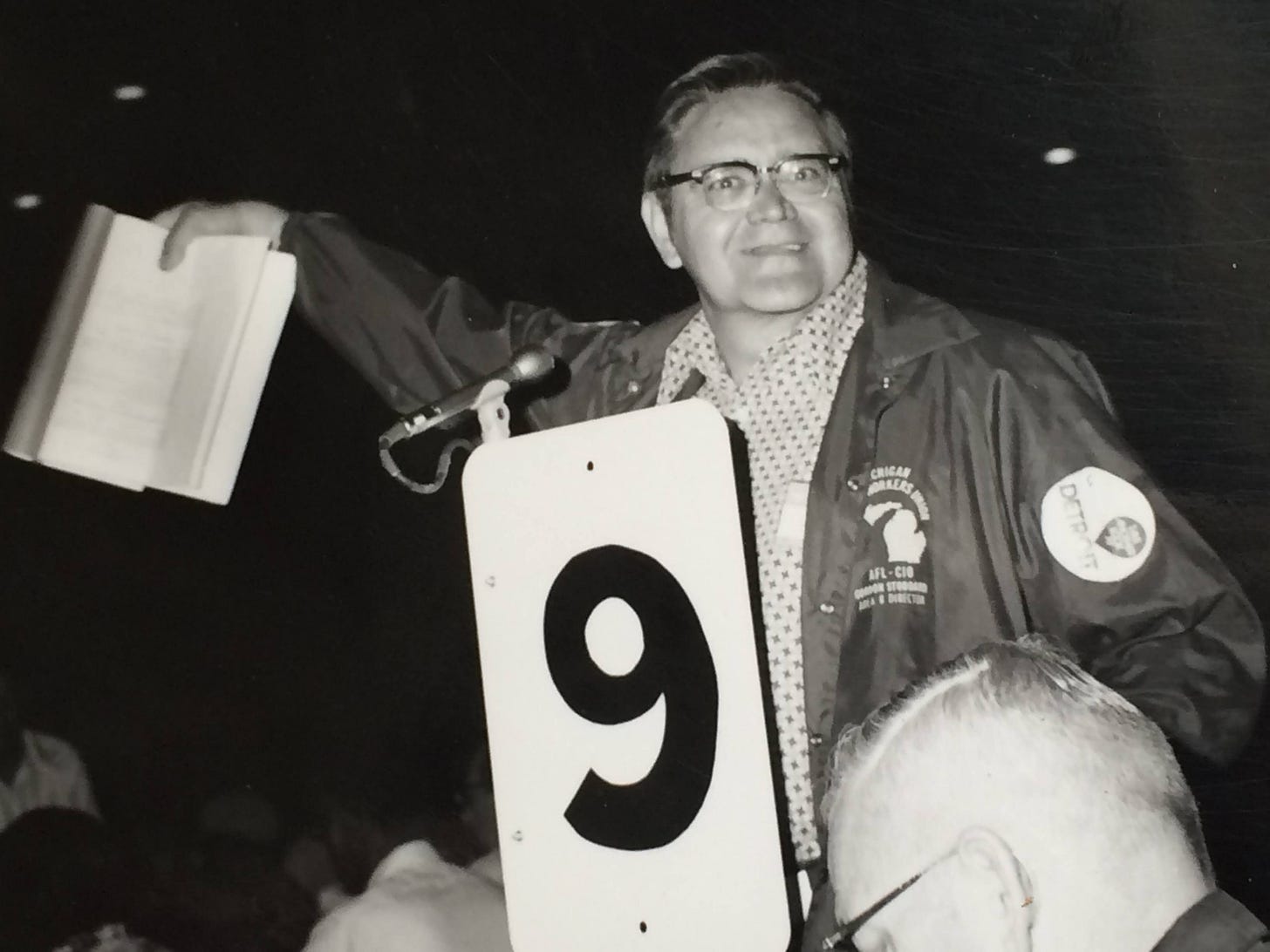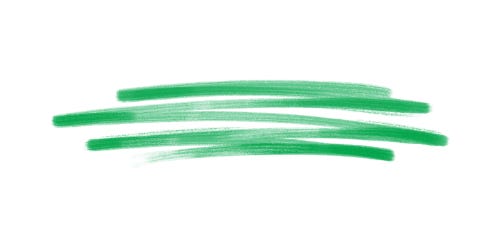Special Update: Reading Periods for Debut Poetry Books or First/Second Books
Trends and data on submission fees, compensation, and more. Focused just on publishers with deadlines for first poetry books.
That’s a photo of my grandpa, Papa to me. It’s a moment from an AFL-CIO meeting decades ago. I wasn’t sure what image to put with this post, but then this one popped into my mind.
I talk about fairness a lot in the Poetry Bulletin, and whenever I use that word, I’m thinking of him. He was the most tender person I knew as a child, and he was also firm when an issue or problem touched on his values. He showed me how love is really at the root of being truly convicted about something. When I talk about power here, I’m really saying: poets, I love you, we can have each other’s backs. When I get angry about parts of the publishing system, I go back to thinking of Papa, and he reminds me to be tender again.
These are ongoing difficult days in the world, and maybe a poetry update is the last thing you need right now. I get it… the poetry news will be here when you need it. Wherever you are, I hope you also have an ancestor with you now to pull you toward whatever it is you most need. 💚
This is a deeper dive into publishing a poetry book in 2025—the usual Poetry Bulletin for February will be on its way soon. I’m also working on a special update on compensation (e.g., royalties, author copies, etc.). I create extra resources like this one as I have the spoons and with the support of paid subscribers. Thank you to everyone who shares these tools with others and backs the project.
Special Focus: Reading Periods for First Books or First/Second Books
In January, I shared the annual update on reading periods for full-length poetry books. Today I’m exploring what the data says about reading periods open only to first books or first/second books.
When it comes to fee fairness and transparency, I feel like reading periods for first books should set the standard. These are doors expressly shaped for launching poets’ publishing careers and finding emerging voices. It seems like it would be essential—part of the mission, really—to make the door wide open and welcoming.
As of the January 2025 update, I track over 170 reading periods for full-length poetry books. Since then, a few new reading periods have been added to the spreadsheet—inevitably whenever I share the annual update, it nudges people to share info in return, which is great!
To keep the data consistent across the 2025 written reports, like this one, I’ll keep working with the spreadsheet as it stood on January 8, 2025, when I released the main annual update. That lets us compare smaller areas, like first books, to the larger whole of poetry book publishing.
⟶ FYI! For simplicity, I’ll be referring to these as “first books” reading periods, rather than continuing to say “first or first/second books” everywhere. Also, please note that this data is all about full-length poetry books (not chapbooks).
This year, 26 of the 170+ poetry reading periods focus on first poetry books or first/second books.
Two of these 26 reading periods charge no fee.
Nine of them offer fee support of some kind.
That’s 11 reading periods for first books—or 42%—that are accessible in some way. This is a little lower than the average of the list as a whole, where 44% of deadlines are accessible.
The rest—15 reading periods for first books—charge anywhere from $20 to $35.
One of these reading periods—the Gatewood Prize at Switchback Books—charges $25, provides no fee support, and offers no cash prize or royalties. More on that below, in the compensation section.
In 2025, almost 60% of reading periods for first books exclude poets who can’t afford to pay.
Last year, 75% of these reading periods excluded poets who can’t afford fees. So that’s a roughly 15% improvement, and that’s good news. But it’s still surprising that the majority of these reading periods are accessible only to poets who can pay to play.
This is a space where access means so much:
→ When you can’t get your early books even considered by a publisher, what happens to your momentum as a writer?
→ Inaccessibility and exclusion have a long-term, practical impact. This is not an abstract problem or a theoretical idea of momentum and accessibility. When you exclude poets because of fees, you’re part of delaying their work and their access to other opportunities, potentially by years.
Most reading periods are annual. And in some cases, that annual deadline is the only chance to be considered by a particular press. So if you miss an opportunity one year because you just can’t afford it, you have to wait another year for the chance to try again.
Having a book is a key to many later stages of a writing vocation (or career, if you like that word): post-publication grants and awards, residencies, invitations to present, chances to read with other writers, interviews, etc.
But those later stages are often out of reach as long as a first book is out of reach. When a reading period isn’t accessible, it has an exponential effect on a writer’s journey.
Reading Periods for First or First/Second Books
I’m sharing the list below with direct links to the presses, in case you don’t want to sort through the big spreadsheet.
Changes Book Prize — This is the most generous and accessible reading period on the entire list. A $10,000 prize and more, with no submission fee.
Switchback Books Gatewood Prize
YesYes Books Pamet River Prize
Inverted Syntax Tabbikha Prize for Poetry (for SWANA diaspora)
Inverted Syntax Aggrey Prize (for BIPOC poets)
Inverted Syntax Sublingua Prize for Poetry (for female-identifying)
Trio House Press First or Second Book Awards
Milkweed Editions Jake Adam York Prize (note caution in October 2024 bulletin)
Agnes Lynch Starrett Poetry Prize
Marystina Santiestevan First Book Prize
Black Lawrence Press St. Lawrence Book Award
Silverfish Review Press’ Gerald Cable Award
Autumn House Rising Writer Prize
BOA Editions - A. Poulin, Jr. Prize
Elixir Press - Antivenom Poetry Award
Tupelo Press - Berkshire Prize
Persea Books - Lexi Rudnitsky First Book Prize
Omnidawn - First and Second Book Contest
Academy of American Poets First Book Award
Fees as an indicator, within an ecosystem
Some of these publishers just received grants from the National Endowment for the Arts here in the United States. I find it useful to notice which publishers are receiving federal funds, CLMP grants, and other resources while continuing to charge high submission fees with no fee waivers.
For instance, Tupelo Press continues to be a top fee charger, does not offer waivers or fee support, and recently received funding totaling $25,000 from the NEA and CLMP.
Tupelo Press had revenue of over $375,000 in their 2023 financial reporting. In that same report, they shared that manuscript submissions brought in $149,240 of “program service revenue.”
In fact, submission fees exceeded Tupelo Press’ book sales, which were $108,402.
Like the case of the National Poetry Series, it’s all of us submitting—this collective of poets that we are, which has more power than we might think—that’s the primary funder of Tupelo Press.
As always, I’m not just trying to wax on about fees alone. I understand some publishers’ rationale behind them, and I hope I’ve been clear and fair about lifting up different models and celebrating the presses trying new things.
To me, submission fees are kind of like an indicator species in the ecosystem of poetry publishing. When we look at them in context, like in the example of Tupelo Press here, I think we can get more clear and honest about the state of acccess, power, and fairness in this ecosystem.
The average submission fee for a first book reading period is higher than the overall average.
In 2025, the overall average fee (for the whole list of 170+ reading periods) is $24. But almost 70% of the reading periods for first books charge more than that. Nine of them charge $30 or more.
In 2025, the average fee among just first book reading periods is $26—one dollar higher than it was in 2024. And $2 higher than the average fee in the full list of reading periods.
In the main 2025 update, I shared how significant the gap can be between presses on the question of fees. Often it’s smaller, scrappy presses that prioritize accessibility with lower fees, skewing the average and blurring the reality of high-charging presses.
When I parsed this for 2025, I found the more accessible reading periods (on the big list) actually charge an average of $15.
If we were to imagine that $15 as a benchmark of a fair (or at least more standard) fee, only one of the charging reading periods for first books meet it: Perugia Press. And Perugia is also fee-free for poets who are Black, Indigenous, and women of color. This is a more accessible model than most reading periods that charge a fee.
Prizes and Compensation for First Books
Two of these reading periods do not offer a cash prize or cash advance:
Green Bottle Press has free submissions for everyone. Authors are given 20 copies of their book and earn royalties after 100 copies are sold.
The Gatewood Prize at Switchback Books charges $25 and offers no fee support. The only thing the author receives, according to their guidelines, is 30 copies of their book.
This is an interesting comparison of two publishing models. Where has each press decided to recoup the cost of doing business? Which approach feels like a more fair relationship with writers?
Among the 24 reading periods for first books that do offer a cash advance or cash prize, the total cash offered comes to $49,500.
Keep in mind that $10,000 of that comes just from Changes Press. With Changes included, the average cash prize is $2,063.
If Changes is pulled out of the group, since it skews the data for the better, the average cash prize for first books is $1,717.
Compensation varies a lot from there. Some presses might offer a lower-than-average prize but offer more author copies or a generous royalty percentage. For instance, the Pamet River Prize at YesYes Books has a $1,000 prize but also includes 40 author copies, 15-25% royalties, and $500 toward a book tour.
The Stakes
There’s probably no more overt or practical place for a press to show their values at work than in their submissions process. It’s the door into a relationship with them. It’s the way they let people come to their table, or not.
Every submission is a chance to choose or refuse the world the publisher is offering. Every submission can be an act of solidarity with fellow poets.
At a time in the world when power keeps flowing into some of the worst hands, it helps me to remember that at least when it comes to my art, I’m not at a loss for what to try next or who to stand with… my art may feel uncertain, it may hold some fear, but it is not disempowered. That might sound earnest, but who cares? All we have is what we make of our next choice, our next poem, our next submission, our next book.
“I have just realized the stakes are myself…”






Wow, so much here!
This is an amazing resource, thank you for compiling!